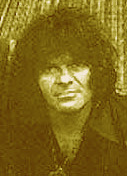


 |   |
Gregory Corso was born in New York City on 26 March 1930. His mother, sixteen years old when Gregory was delivered, abandoned the family a year later and returned to Italy. Afterwards, Corso spent most of his childhood in orphanages and foster homes. His father remarried when Gregory was eleven years old, and he had his son stay with him, but the boy repeatedly ran away. He was removed to a boy's home, from which he also ran away. His troubled adolescence included a stint of several months in the Tombs, the New York City jail, for a case involving a stolen radio, and three months of observation in Bellevue. At seventeen, he was convicted of theft and sentenced to Clinton State Prison for three years. During his incarceration, he read avidly from the prison library and began writing poetry. After his release in 1950, he met Allen Ginsberg, through whom he also became acquainted with William Burroughs and Jack Kerouac, as well as other New York writers and artists. In 1952 he worked for the Los Angeles Examiner and later served as a merchant seaman. In 1954 he unofficially attended Harvard University, where students contributed to the publication of his first collection of poems, The Vestal Lady on Brattle and Other Poems. Two years later he joined Ginsberg in San Francisco, where Lawrence Ferlinghetti published his volume of poems Gasoline. In 1957 Corso joined Kerouac and Ginsberg for a series of unconventional readings and interviews. Since that time he has traveled extensively, especially in Mexico and Eastern Europe. He taught briefly at the State University of New York at Buffalo and occasionally during summer sessions at the Naropa University in Boulder, Colorado. His major publications after Gasoline include The Happy Birthday of Death (1960), The American Express (1961), Long Live Man (1962), Elegaic Feelings American (1970), Herald of the Autochthonic Spirit (1981), and Mindfield (1991). Though he never gained the truly widespread fame that his fellow Beats enjoyed, his work continues to have an impact on contemporary poetics. His poetry has earned praise from many. Jack Kerouac is quoted as saying (on the back cover of Corso's Gasoline) "I think that Gregory Corso and Allen Ginsberg are the two best poets in America and that they can't be compared to each other. Gregory was a tough young kid from the Lower East Side who rose like an angel over the rooftops and sang Italian songs as sweet as Caruso and Sinatra, but in words. 'Sweet Milanese hills' brood in his Renaissance soul, evening is coming on the hills. Amazing and beautiful Gregory Corso, the one & only Gregory the Herald. Read slowly and see." Bob Dylan has spoken about how Corso's "Gasoline" awakened him to new possibilities of the written word. Gregory Corso died on January 17, 2001 at the age of seventy years old. |